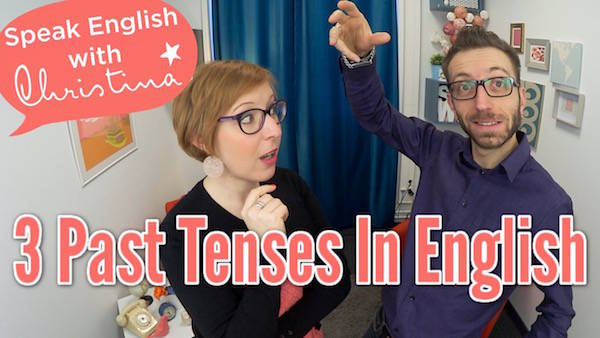
Have you ever tried telling a story to a friend and well, you start having all sorts of difficulties with the tenses? Especially the past tenses in English?
Like Romain, in today’s lesson. He mixes up all his past tenses in English:
“Hey Christina, guess what happened yesterday? I drove my tram and I see Patrick! He went to get a pizza for dinner because he forgets to go to buy groceries on his way home from work earlier.”
Does this sound like you when you’re telling a story in English?
You’ve been speaking English for 10 years, but you’re still confused with the past tenses in English. Don’t worry, today you’ll learn how to tell stories with the correct tenses in English. Let’s go!
MIXING PAST TENSES IN ENGLISH
The hard part about telling stories, is that you mix up all the tenses. English, there are 3 past tenses we use very often to tell stories:
Past simple: I did, I went, I ate, etc.
Past continuous: I was doing, I was going, I was eating
Past Perfect Simple: I had done, I had gone, and I had eaten.
To use these tenses, you’ll need to be a conjugation ninja!
It helps if you know how to conjugate the verbs. I like this table of tenses in English, from Englisch-hilfen.de. It’s very complete, so print it and put it on your fridge!
PAST SIMPLE IN ENGLISH
You already know that for the past simple, there are regular verbs and irregular verbs.
If the verb is regular, it’s easy, you just add -ed to the verb: lived, tried, visited, waited, watched, finished. Just the pronunciation changes, and if you want, I can make a lesson on how to pronounce -ed in regular verbs. Just let me know in the comments.
If the verb is irregular, you just have to learn the past simple conjugation.You have a lesson dedicated to the 8 most common irregular verbs in English here.
So the structure of the past simple is pretty simple, you just have to learn the irregular verbs.
And remember, you use past simple verbs when the action is finished. Last week, yesterday, etc.
Watch the lesson to find out! Watch the video lesson for some examples, used in a conversation between Romain and me.
In stories, we often combine the past simple with the past continuous.
PAST CONTINUOUS IN ENGLISH
For the past continuous, you’ll use “was” or “were”,plus the verb + -ing : I was driving, you were saying, he or she was going, we were thinking about, they were wondering.
Those are a few verbs we often use in the past continuous. Of course, your choice of “was” or “were” depends on the subject of your sentence. I was, you were, etc.
You can play a game and test yourself on the past continuous in the video lesson!
Which action was longer, like a background action?
Which past action was a shorter?

PAST PERFECT SIMPLE IN ENGLISH
For the past perfect simple, you’ll use “had” No conjugation it’s always “had” Yay! So “had”, plus the past participle. That’s the 3rd column on the list of irregular verbs. You have a conjugation challenge!
Let’s see some examples:
My computer crashed and I realized I’d forgotten to save everything.
I got to work and I realized I’d left my lunch at home.
And then, the fire alarm went off! Fortunately, we had finished the job interview.
We use the past perfect tense to describe an action that was more in the past than other past actions in our story.
Let’s take one of those examples:
I got to work and I realized I’d left my lunch at home. So I went out for lunch!
“I got to work”: let’s say that was at 9am.
“I realized”: Probably just after, so 9:01 am.
“I’d left my lunch at home.”: That was before, maybe at 8:30, when I left home.
So “I’d left” is more in the past than “I got to work” and “I realized”. That’s why it’s in the past perfect simple.
WHAT ABOUT YOU?
Have you ever had difficulties using these tenses to tell stories?
Do you have a secret to share about how you remember which tense to use?
Tell us in the comments because we can all learn from your stories and your tips!
And don’t forget to get your copy of “What the Faute?” Here’s the link again.
Christina

More English lessons...
Click the image to see the lesson









Il y a une liste que j’ai faite et prise du livre A à Z qui explique avec quels adverbes ils vont! Mes élèves l’apprenaient par coeur et ça les a aidés!
Hi Muriel, what’s that book? I’d love to have a look at it, because maybe I could find some inspiration for future lessons! Can you send me the link to it please? Thanks!
Thank you thank you!
I was working when I realized I was hungry however I had had lunch an hour ago…
Is that correct? had had???
Hi Magali, yes that is absolutely correct! Way to go, because you managed to use all 3 tenses in one sentence! And yes, I had had lunch an hour ago is absolutely correct (even though it sounds strange).
I am very happy after watching this video I did not know when to use had and when to used end but now I am very cleared after this video thank you very much.
That’s great to hear Basit! I’m so proud of you!
Hai mam Good evening,
This is Murugan from India. I have watched your videos and website it really helpful for me and I need a complex lesson in speaking and writing an essay because I will write IELTS exam next month 3rd so I need to improve this section please help me.Thank you.
Hi Murugan,
Thanks for your kind words, and I’m glad that you’re going to do an exam to get a certification for your English. If you need help with the IELTS, I can recommend a specific course for this: http://bit.ly/courseIELTS
Best of luck with the IELTS!
Shade variation is observed on the boxes
And
Shade variation has observed
Can you plz explain the difference between these 2 sentences
Hi Shweta,
Sure!
“Shade variation is observed” is the passive voice. The active way to say it would be “We observe shade variation.” With the passive voice, we don’t say the subject, the person or thing doing the action. So in “Shade variation is observed”, we don’t know who does the observations.
For “Shade variation has observed”, this sentence is both incomplete and incorrect. Shade variation is the subject, “has observed” is the verb in the present perfect simple, in active voice. To complete the sentence, you need a direct object, like “Shade variation has observed XXX”, but that doesn’t make sense because shade variation is not something that can observe.
There you go!
Hi,
This is Kirubhashini from India. I teach English here for a corporate company. I would like to get suggestions in how to teach for these people. Tnq.
Hi Kirubhashini, Great to have a fellow English teacher here! What specific questions do you have about teaching?
I’ve been trying so hard to get my grammar correctly while conversing with my friends.
Sometimes I got confused during my conversation and mixed up .
Hi Twincy,
It sounds like you have clearly identified what’s blocking you, which is a good step towards improving. May I ask what you do to improve your grammar?